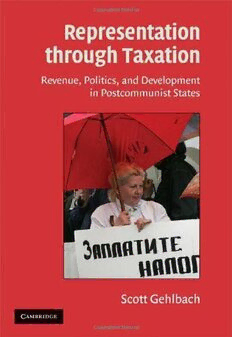
Representation through Taxation: Revenue, Politics, and Development in Postcommunist States PDF
216 Pages·2008·1.114 MB·English
Most books are stored in the elastic cloud where traffic is expensive. For this reason, we have a limit on daily download.
Preview Representation through Taxation: Revenue, Politics, and Development in Postcommunist States
Description:
Social scientists teach that politicians favor groups that are organized over those that are not. Representation Through Taxation challenges this conventional wisdom. Emphasizing that there are limits to what organized interests can credibly promise in return for favorable treatment, Gehlbach shows that politicians may instead give preference to groups - organized or not - that by their nature happen to take actions that are politically valuable. Gehlbach develops this argument in the context of the postcommunist experience, focusing on the incentive of politicians to promote sectors that are naturally more tax compliant, regardless of their organization. In the former Soviet Union, tax systems were structured around familiar revenue sources, magnifying this incentive and helping to prejudice policy against new private enterprise. In Eastern Europe, in contrast, tax systems were created to cast the revenue net more widely, encouraging politicians to provide the collective goods necessary for new firms to flourish.
See more
The list of books you might like
Most books are stored in the elastic cloud where traffic is expensive. For this reason, we have a limit on daily download.
